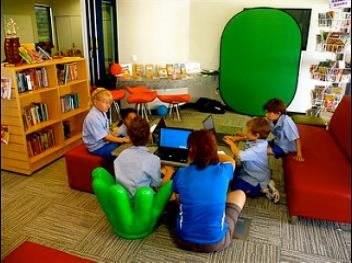Teaching for Learning: Social Responsibility
Update December 2020:
This web page is a companion to the 2016 version of the School Library Program Rubric. NYSED released an updated School Library Program Rubric in December 2020.
Student Snapshot: Students seek multiple perspectives and use information and ideas expressed in any format in a safe, responsible, and ethical manner.
According to Woolls and Loertscher (2013) social responsibility is demonstrated when students are taught to recognize the importance of information in a democratic society, practice ethical behavior in regard to information and technology, to seek multiple perspectives, to share information, and collaborate in its use in groups.
Source: Woolls, Blanche, and David V. Loertscher. The Whole School Library Handbook 2. ALA Editions, 2013.
Citation for the Photo: Hughes, Fran. St John’s Silkwood. 2010. Flickr.
This web page features a photo from Fran Hughes, available under Creative Commons Attribution 2.0 Generic license.
In Practice
Oregon School Library Standards
Description: “The Social Responsibility strand has three standards: Practice ethical behavior to share knowledge; Practice ethical behavior when using print and digital resources; Participate collaboratively, respectfully and productively as a member of a democratic society. As explained in this presentation, the social responsibility “... strand defines how the learner will “ Share knowledge and participate ethically and productively as members of our democratic society.”
Resource/Citation: Christensen, Peggy. "The Oregon School Library Standards." Oregon School Library Standards, 30 June 2013.
The New Librarian: Leaders in the Digital Age
Description: Part of a series of case studies produced by Digital Promise examining the work of members in a League of Innovative Schools. A cohort of 33 teacher-librarians is viewed as “indispensable” to the Vancouver Public Schools, WA district’s vision of a technology-infused path to improved outcomes for students. “Teacher-librarians at VPS play a crucial role in this digital transformation and other strategic initiatives.” As a result, they are expanding their “role to spend more time in the classroom, curating digital content and lesson plans with teachers, teaching digital citizenship to students, and even emerging as technology experts within their schools.”
Resource/Citation: Digital Promise. “The New Librarian: Leaders in the Digital Age.” Digital Promise, 1 October 2014.
Net Cetera
Description: The Federal Trade Commission (FTC) and other government agencies offer guidance to help parents and teachers steer kids safely through the online and mobile-phone worlds.
Resource/Citation: “Net Cetera.” OnGuard Online.gov.
In Theory
How Do School Librarians Perceive Dispositions for Learning and Social Responsibility?
Description: A study asked school librarians how they perceive dispositions for learning including social responsibility, to what extent their role involves fostering these dispositions among students. Descriptive results reveal the most common areas discussed by participants; social responsibility was the most cited disposition.
*Resource/Citation: Arnone, Marilynn. “How Do School Librarians Perceive Dispositions for Learning and Social Responsibility?” School Library Monthly, vol. 26, no. 7, Mar 2010, pp. 40-43
Encourage Academic Integrity and Prevent Plagiarism
Description: The library at the City College of San Francisco provides support for teachers around preventing plagiarism; some of these strategies may apply to librarians as well. The library defines plagiarism, links to outside resources, and recommends teaching strategies for preventing and identifying plagiarism.
Resource/Citation: "Encourage Academic Integrity and Prevent Plagiarism." Library and Learning Resources, 11 November 2015.
Generating Knowledge and Avoiding Plagiarism: Smart Information Use by High School Students
Description: Williamson and McGregor interviewed high school students and teachers who participated in a program to avoid plagiarism, and share the program and its effectiveness. The conclusion of the article emphasizes collaboration between teachers and librarians.
Resource/Citation: Williamson, Kirsty, and Joy McGregor. "Generating Knowledge and Avoiding Plagiarism: Smart Information Use by High School Students." School Library Research, vol. 14, 2011, pp. 1-21.
Consultant
Name: Susan Polos
Email: suz.polos@gmail.com
Bio: Susan is a School Librarian at Mount Kisco Elementary in Mt. Kisco, NY.
*To access restricted database articles speak with your school librarian or public librarian.







